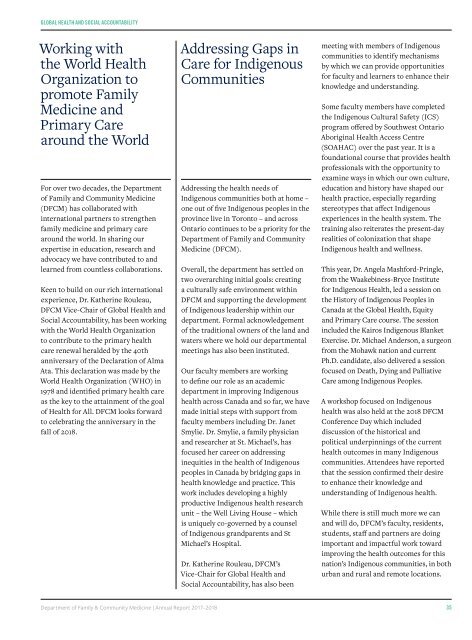DFCM Annual Report 2017-2018
You also want an ePaper? Increase the reach of your titles
YUMPU automatically turns print PDFs into web optimized ePapers that Google loves.
GLOBAL HEALTH AND SOCIAL ACCOUNTABILITY<br />
Working with<br />
the World Health<br />
Organization to<br />
promote Family<br />
Medicine and<br />
Primary Care<br />
around the World<br />
For over two decades, the Department<br />
of Family and Community Medicine<br />
(<strong>DFCM</strong>) has collaborated with<br />
international partners to strengthen<br />
family medicine and primary care<br />
around the world. In sharing our<br />
expertise in education, research and<br />
advocacy we have contributed to and<br />
learned from countless collaborations.<br />
Keen to build on our rich international<br />
experience, Dr. Katherine Rouleau,<br />
<strong>DFCM</strong> Vice-Chair of Global Health and<br />
Social Accountability, has been working<br />
with the World Health Organization<br />
to contribute to the primary health<br />
care renewal heralded by the 40th<br />
anniversary of the Declaration of Alma<br />
Ata. This declaration was made by the<br />
World Health Organization (WHO) in<br />
1978 and identified primary health care<br />
as the key to the attainment of the goal<br />
of Health for All. <strong>DFCM</strong> looks forward<br />
to celebrating the anniversary in the<br />
fall of <strong>2018</strong>.<br />
Addressing Gaps in<br />
Care for Indigenous<br />
Communities<br />
Addressing the health needs of<br />
Indigenous communities both at home –<br />
one out of five Indigenous peoples in the<br />
province live in Toronto – and across<br />
Ontario continues to be a priority for the<br />
Department of Family and Community<br />
Medicine (<strong>DFCM</strong>).<br />
Overall, the department has settled on<br />
two overarching initial goals: creating<br />
a culturally safe environment within<br />
<strong>DFCM</strong> and supporting the development<br />
of Indigenous leadership within our<br />
department. Formal acknowledgement<br />
of the traditional owners of the land and<br />
waters where we hold our departmental<br />
meetings has also been instituted.<br />
Our faculty members are working<br />
to define our role as an academic<br />
department in improving Indigenous<br />
health across Canada and so far, we have<br />
made initial steps with support from<br />
faculty members including Dr. Janet<br />
Smylie. Dr. Smylie, a family physician<br />
and researcher at St. Michael’s, has<br />
focused her career on addressing<br />
inequities in the health of Indigenous<br />
peoples in Canada by bridging gaps in<br />
health knowledge and practice. This<br />
work includes developing a highly<br />
productive Indigenous health research<br />
unit – the Well Living House – which<br />
is uniquely co-governed by a counsel<br />
of Indigenous grandparents and St<br />
Michael’s Hospital.<br />
Dr. Katherine Rouleau, <strong>DFCM</strong>’s<br />
Vice-Chair for Global Health and<br />
Social Accountability, has also been<br />
meeting with members of Indigenous<br />
communities to identify mechanisms<br />
by which we can provide opportunities<br />
for faculty and learners to enhance their<br />
knowledge and understanding.<br />
Some faculty members have completed<br />
the Indigenous Cultural Safety (ICS)<br />
program offered by Southwest Ontario<br />
Aboriginal Health Access Centre<br />
(SOAHAC) over the past year. It is a<br />
foundational course that provides health<br />
professionals with the opportunity to<br />
examine ways in which our own culture,<br />
education and history have shaped our<br />
health practice, especially regarding<br />
stereotypes that affect Indigenous<br />
experiences in the health system. The<br />
training also reiterates the present-day<br />
realities of colonization that shape<br />
Indigenous health and wellness.<br />
This year, Dr. Angela Mashford-Pringle,<br />
from the Waakebiness-Bryce Institute<br />
for Indigenous Health, led a session on<br />
the History of Indigenous Peoples in<br />
Canada at the Global Health, Equity<br />
and Primary Care course. The session<br />
included the Kairos Indigenous Blanket<br />
Exercise. Dr. Michael Anderson, a surgeon<br />
from the Mohawk nation and current<br />
Ph.D. candidate, also delivered a session<br />
focused on Death, Dying and Palliative<br />
Care among Indigenous Peoples.<br />
A workshop focused on Indigenous<br />
health was also held at the <strong>2018</strong> <strong>DFCM</strong><br />
Conference Day which included<br />
discussion of the historical and<br />
political underpinnings of the current<br />
health outcomes in many Indigenous<br />
communities. Attendees have reported<br />
that the session confirmed their desire<br />
to enhance their knowledge and<br />
understanding of Indigenous health.<br />
While there is still much more we can<br />
and will do, <strong>DFCM</strong>’s faculty, residents,<br />
students, staff and partners are doing<br />
important and impactful work toward<br />
improving the health outcomes for this<br />
nation’s Indigenous communities, in both<br />
urban and rural and remote locations.<br />
Department of Family & Community Medicine | <strong>Annual</strong> <strong>Report</strong> <strong>2017</strong>–<strong>2018</strong> 35


